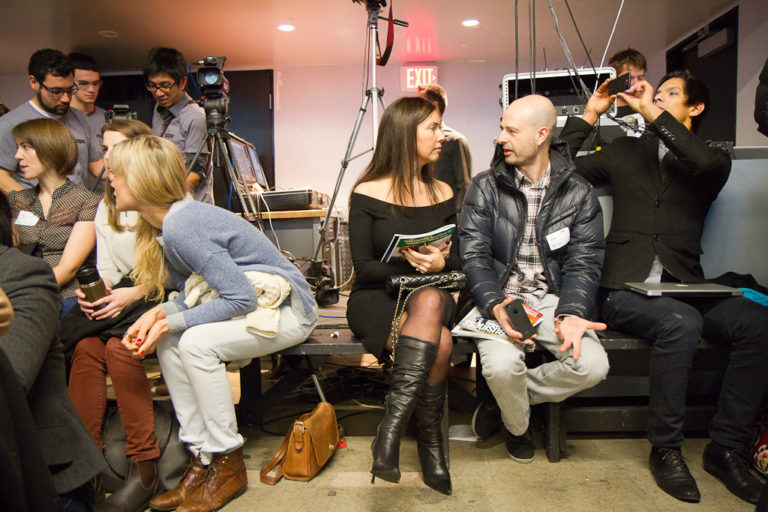
Image by Trevor Jansen.
Why Boundaries Are Overrated, Even at Work
Many people, understandably, cringe at the term network. It’s been conflated with awkward mixers where people stand around eyeing one another’s name badges and making thinly veiled, but ultimately transactional conversation. That kind of artificial setting can make even the extroverted among us want to go hide behind a nice, tall plant with a beer rather than brave the feeling of being reduced to our resumes.
But this isn’t how genuine networks get formed. Rather than meeting at forced mixers, most collaborators bump into one another through shared activities like pick-up basketball, improv comedy groups, rifling through old records at a flea market while learning at a Creative Mornings lecture, a welding workshop at their local arts studio, or a coding class at the community center, through friends at a beer garden or a great house party, or through shared space like a co-working kitchen or apartment complex courtyard.
Friendship, like love, happens when you least expect it. It happens when you’re just going about your already fabulous life, doing things that sound fun and interesting, and intersecting with other people doing the same.

These connections, born of serendipity and a little bit of intention (I’m a big proponent of sending nerdy emails to people you have met briefly and really want to hang out with again.) lead to friendship, sure, but also lead to job opportunities. Whereas boomers needed a cohort of colleagues big enough to weather the occasional layoff or rare career transition, their sons and daughters need a network robust enough to support constant flux. The average stay at a full-time job has shrunk to just 4.4 years on average and most freelancers have a few gigs going at all times, depending on how absorbing each one is. You need a lot of cool friends to feed that kind of fire.
Fundraiser Jennifer McCrea and philanthropist Jeffrey C. Walker, authors of The Generosity Network: New Transformational Tools for Successful Fund-raising, believe that “true generosity is rooted in relatedness” and encourage people to create a “jazz band” of supporters and friends with a variety of different gifts and geographies. Unlike the outdated dogma peddled at too many college career counseling offices, they don’t profess to have a step-by-step guide to making it happen:
“There’s no way to script real human connections. And that’s a good thing. The outcome is so much more interesting — and potentially rewarding — than what we’d get if we followed a formula.”
Amen to that. The once thick, black line between personal and professional connections appears to be fading for many of us. It certainly has for me. My best collaborators are also my best friends. It can be messy, sure, but the benefits of being able to show up as my whole self and spend time with people I love, while making money, far outweigh the extra intention and accountability I have to put into it. We know how to bring the best out in each other. We can more effectively mentor one another through challenges because, unlike a colleague who might be at arm’s length, we’re aware of one another’s history, our idiosyncrasies, our emotional lives. Best of all: when we kickass, we get to celebrate together.

Even the language that we use to describe colleagues these days blends the personal and the professional; people affectionately refer to their “work wives” and “work husbands.” In part, it’s a critique of how much time some of us spend at work, but it’s also an acknowledgment of the intimacy that forms between people who are closely aligned and looking out for one another. If you’re going to spend something like eight hours a day interacting with someone, let it be someone you really, genuinely love.
Dr. Amy Banks, author of Four Ways to Click: Rewire Your Brain for Stronger, More Rewarding Relationships, argues that “boundaries are overrated.” She doesn’t mean that healthy relationships don’t have some balance between intimacy and distance but that we’re all better off when we’re brave and authentic, even among people we have a professional connection with. She writes:
“Relationships are a dynamic process of experiencing, learning, and integrating your knowledge so that you are able to see both yourself and the other person more deeply and more clearly.”
It’s as if we used to see people within our professional networks as a bowl full of apples to be sliced and diced in the most efficient, lucrative ways possible. Now we’re seeing people as onions with layers to be peeled. What we discover has potential much more nuanced than a bigger paycheck, though that’s often a byproduct of a more humanized connection. We understand ourselves better through our friends and collaborators’ eyes. We reach for promotions or projects that we might have been too intimidated for if we felt like we were going it solo. We have more fun.
Social media, of course, has helped supercharge our networks, but there’s something fundamental to the experience of creating relationship face-to-face. People no doubt benefit professionally from sites like LinkedIn and Twitter, but the “action” on those sites is made exponentially more interesting and productive when the online linkages are grounded in “on land” relationships.
Which means that even if you feel safest behind the warm glow of a familiar screen, you have to venture out and seek human contact. You have to ask good questions of people that work far afield of you. You have to bump into enough people that you eventually latch right on to your ideal collaborator, your work wife or husband, and, most importantly, your dear and true friend.



Share your reflection